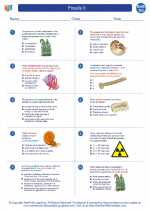Vitamins
Vitamins are essential organic compounds that the human body needs in small amounts to function properly. They are crucial for various biological processes such as growth, digestion, and nerve function. Vitamins are classified into two categories: water-soluble and fat-soluble.
Water-soluble Vitamins
Water-soluble vitamins include vitamin C and the B-complex vitamins (B1, B2, B3, B5, B6, B7, B9, B12). These vitamins are not stored in the body in large amounts and are excreted in the urine, so they need to be consumed regularly through the diet.
Fat-soluble Vitamins
Fat-soluble vitamins include vitamins A, D, E, and K. These vitamins are stored in the body's fatty tissues and liver, and are released as needed. Consuming these vitamins with some dietary fat can help their absorption.
Sources of Vitamins
Vitamins can be obtained from various food sources such as fruits, vegetables, dairy products, eggs, fish, and meat. Some people may also require vitamin supplements to ensure they meet their nutritional needs.
Functions of Vitamins
Each vitamin has specific functions in the body. For example, vitamin C is essential for collagen production and immune function, while vitamin D is important for bone health and calcium absorption. Understanding the functions of each vitamin is crucial for maintaining a balanced and healthy diet.
Study Guide
- Define vitamins and explain their importance in the human body.
- Classify vitamins into water-soluble and fat-soluble categories and provide examples of each.
- Discuss the sources of vitamins and the importance of obtaining them through a balanced diet.
- Explain the functions of at least three different vitamins and their impact on human health.
- Compare and contrast water-soluble and fat-soluble vitamins in terms of storage and excretion from the body.
- Discuss the potential risks of vitamin deficiencies and excess intake.
Understanding the role of vitamins in maintaining overall health is essential for leading a healthy lifestyle. Regular consumption of a diverse range of nutrient-rich foods and, if necessary, appropriate vitamin supplements, can help ensure that the body receives an adequate supply of essential vitamins.
.


